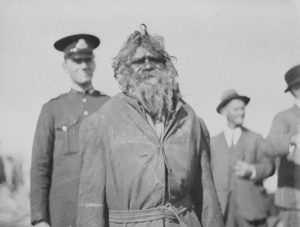Jimmy Clements facts for kids
Quick facts for kids
Jimmy Clements
|
|
|---|---|

Jimmy Clements, also known as "King Billy", at the opening of the Australian Federal Parliament, 1927.
|
|
| Born | c. 1847 Australia
|
| Died | 28 August 1927 Queanbeyan, New South Wales, Australia
|
Jimmy Clements (born around 1847 – died 28 August 1927) was an important Aboriginal elder. He belonged to the Wiradjuri tribe in Australia. He is well-known for being at the opening of the first Provisional Parliament House in Canberra on 9 May 1927.
At this important event, Jimmy Clements made history. He explained that he was there to show his "sovereign rights to the Federal Territory." This means he was showing that Indigenous people had their own rights to the land. This was the first recorded time an Aboriginal protest happened at the Parliament.
Who Was Jimmy Clements?
Jimmy Clements was also known by other names. People called him "King Billy." He was also known as Nangar or Yangar. He was a respected elder from the Wiradjuri people.
A Journey to Parliament
Jimmy Clements and another Wiradjuri man, John Noble, made a long journey to Canberra. They walked for almost a week. They travelled over mountains from Brungle Mission. This mission was near Gundagai.
These two men were the only Indigenous people to attend the first opening of parliament. Their presence was very significant.
Standing Up for Rights
When they arrived at the ceremony, police initially told Jimmy Clements to leave. This was because of his traditional clothes. However, many people in the crowd supported him. They wanted him to stay.
Because of this popular support, Jimmy Clements was allowed to remain. He was even among the important citizens who met the Duke and Duchess of York. This meeting was a special moment.
His Legacy
Jimmy Clements passed away on 28 August 1927. He was 80 years old. He died in Queanbeyan, which is near Canberra.
Newspaper reports at the time noted where he was buried. He was laid to rest in Queanbeyan cemetery. His actions at the Parliament House opening are remembered as an early and important step in Aboriginal rights protests in Australia.

